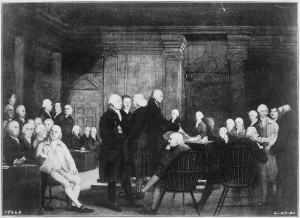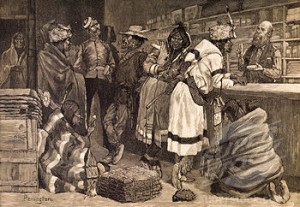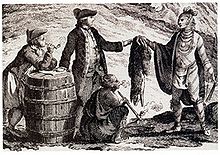Though Europeans early on decided that their own culture should dominate the continent, they also recognized their need for, and dependence upon, relationships with Native Americans. Going beyond fanciful grade-school depictions of friendly meetings between native peoples and newcomers, reality shows that trade was a tried and true method of getting to know one another and establishing relationships. The northern and southern colonies loosely coalesced into organized units and each formed a superintendency of Indian affairs. Later on, the Continental Congress created three similar departments, the Northern, Middle, and Southern. Each department was headed by a commissioner, and the departments’ function was mainly to preserve peace and harmonious relationships with Native Americans and prevent the various tribes from siding against the colonies during their fight for independence.
Once the new nation was established, Congress considered trade and commerce with Native Americans to be of national concern. They had this issue in mind when founders wrote Section 8, Article 1 of the Constitution: Congress had the power to “regulate Commerce with Foreign nations and among the several states, and with the Indian tribes.” In this section, it is plain that Native Americans were independent entities and separate from the new nation and its citizens. Congress also recognized that Indian nations were at a disadvantage in dealing with Europeans and had been taken advantage of by unscrupulous traders. The nation quickly established an act (1790) which prohibited any person to trade with Indian tribes without a license issued by a superintendent of one of the Indian departments.
______________________________________________________________________________________


